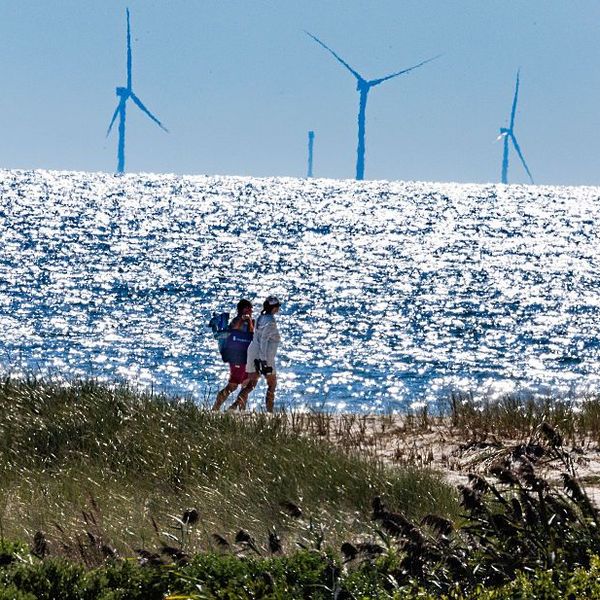
Supporters of renewable energy marched in Philadephia in July 2016. (Photo: Becker1999/Flickr/cc)
Analysis: More Than 100 Cities Now Mostly Powered by Renewable Energy
"Cities not only want to shift to renewable energy but, most importantly—they can."
More than 100 cities across the globe are now mostly powered by renewable energy, a number that has more than doubled over the past three years, according to a review of environmental data collected from entities worldwide.
The new analysis, a tally of information collected by the U.K.-based group CDP and released Tuesday, accounts for towns and cities that get at least 70 percent of their electricity from renewable sources such as wind and solar. In addition to publishing its complete list, the group created an interactive map that features key details about some municipalities' transitions.
While only four U.S. cities made the list--Aspen, Colorado; Burlington, Vermont; Eugene, Oregon; and Seattle, Washington--the group says 58 localities in the United States have committed to a full transition. Among the largest cities on CDP's list are Auckland, New Zealand; Nairobi, Kenya; Oslo, Norway; and Vancouver, Canada. Forty-seven of the cities listed are located in Brazil. More than 40 cities--from Burlington to Reykjavik, Iceland to Basel, Switzerland--are fully powered by renewables.
"Through our diverse mix of biomass, hydro, wind, and solar, we have seen first-hand that renewable energy boosts our local economy and creates a healthier place to work, live, and raise a family."
--Miro Weinberger, Burlington Mayor
"Through our diverse mix of biomass, hydro, wind, and solar, we have seen first-hand that renewable energy boosts our local economy and creates a healthier place to work, live, and raise a family," said Burlington Mayor Miro Weinberger, who urged "other cities around the globe to follow our innovative path as we all work toward a more sustainable energy future."
"Cities are responsible for 70 percent of energy-related CO2 emissions and there is immense potential for them to lead on building a sustainable economy. Reassuringly, our data shows much commitment and ambition," said Kyra Appleby, CDP's director of cities. "Cities not only want to shift to renewable energy but, most importantly--they can."
The new data reflects the rapidly growing trend to commit to a renewable energy transition at a local level. CDP noted in a statement that Tuesday's analysis "comes on the same day the UK100 network of local government leaders announce that over 80 UK towns and cities have committed to 100 percent clean energy by 2050, including Manchester, Birmingham, Newcastle, Glasgow, and 16 London boroughs."
The group attributed the rising excitement about energy transitions in part to the Global Covenant of Mayors for Climate and Energy, which claims to be "the broadest global alliance committed to climate leadership, building on the commitment of over 7,400 cities and local governments from six continents and 121 countries representing more than 600 million residents." The alliance launched last summer, after U.S. President Donald Trump revealed his intention to withdraw from the Paris Climate Agreement.
The transition trend is being driven not only by a widespread desire to eliminate the use of oil and gas--which is fueling the global climate crisis--but also by economic arguments. An International Renewable Energy Agency report (pdf) published in January found that "by 2020, all the renewable power generation technologies that are now in commercial use are expected to fall within the fossil fuel-fired cost range, with most at the lower end or undercutting fossil fuels," meaning "electricity from renewables will soon be consistently cheaper than from most fossil fuels."
An Urgent Message From Our Co-Founder
Dear Common Dreams reader, The U.S. is on a fast track to authoritarianism like nothing I've ever seen. Meanwhile, corporate news outlets are utterly capitulating to Trump, twisting their coverage to avoid drawing his ire while lining up to stuff cash in his pockets. That's why I believe that Common Dreams is doing the best and most consequential reporting that we've ever done. Our small but mighty team is a progressive reporting powerhouse, covering the news every day that the corporate media never will. Our mission has always been simple: To inform. To inspire. And to ignite change for the common good. Now here's the key piece that I want all our readers to understand: None of this would be possible without your financial support. That's not just some fundraising cliche. It's the absolute and literal truth. We don't accept corporate advertising and never will. We don't have a paywall because we don't think people should be blocked from critical news based on their ability to pay. Everything we do is funded by the donations of readers like you. Will you donate now to help power the nonprofit, independent reporting of Common Dreams? Thank you for being a vital member of our community. Together, we can keep independent journalism alive when it’s needed most. - Craig Brown, Co-founder |
More than 100 cities across the globe are now mostly powered by renewable energy, a number that has more than doubled over the past three years, according to a review of environmental data collected from entities worldwide.
The new analysis, a tally of information collected by the U.K.-based group CDP and released Tuesday, accounts for towns and cities that get at least 70 percent of their electricity from renewable sources such as wind and solar. In addition to publishing its complete list, the group created an interactive map that features key details about some municipalities' transitions.
While only four U.S. cities made the list--Aspen, Colorado; Burlington, Vermont; Eugene, Oregon; and Seattle, Washington--the group says 58 localities in the United States have committed to a full transition. Among the largest cities on CDP's list are Auckland, New Zealand; Nairobi, Kenya; Oslo, Norway; and Vancouver, Canada. Forty-seven of the cities listed are located in Brazil. More than 40 cities--from Burlington to Reykjavik, Iceland to Basel, Switzerland--are fully powered by renewables.
"Through our diverse mix of biomass, hydro, wind, and solar, we have seen first-hand that renewable energy boosts our local economy and creates a healthier place to work, live, and raise a family."
--Miro Weinberger, Burlington Mayor
"Through our diverse mix of biomass, hydro, wind, and solar, we have seen first-hand that renewable energy boosts our local economy and creates a healthier place to work, live, and raise a family," said Burlington Mayor Miro Weinberger, who urged "other cities around the globe to follow our innovative path as we all work toward a more sustainable energy future."
"Cities are responsible for 70 percent of energy-related CO2 emissions and there is immense potential for them to lead on building a sustainable economy. Reassuringly, our data shows much commitment and ambition," said Kyra Appleby, CDP's director of cities. "Cities not only want to shift to renewable energy but, most importantly--they can."
The new data reflects the rapidly growing trend to commit to a renewable energy transition at a local level. CDP noted in a statement that Tuesday's analysis "comes on the same day the UK100 network of local government leaders announce that over 80 UK towns and cities have committed to 100 percent clean energy by 2050, including Manchester, Birmingham, Newcastle, Glasgow, and 16 London boroughs."
The group attributed the rising excitement about energy transitions in part to the Global Covenant of Mayors for Climate and Energy, which claims to be "the broadest global alliance committed to climate leadership, building on the commitment of over 7,400 cities and local governments from six continents and 121 countries representing more than 600 million residents." The alliance launched last summer, after U.S. President Donald Trump revealed his intention to withdraw from the Paris Climate Agreement.
The transition trend is being driven not only by a widespread desire to eliminate the use of oil and gas--which is fueling the global climate crisis--but also by economic arguments. An International Renewable Energy Agency report (pdf) published in January found that "by 2020, all the renewable power generation technologies that are now in commercial use are expected to fall within the fossil fuel-fired cost range, with most at the lower end or undercutting fossil fuels," meaning "electricity from renewables will soon be consistently cheaper than from most fossil fuels."
More than 100 cities across the globe are now mostly powered by renewable energy, a number that has more than doubled over the past three years, according to a review of environmental data collected from entities worldwide.
The new analysis, a tally of information collected by the U.K.-based group CDP and released Tuesday, accounts for towns and cities that get at least 70 percent of their electricity from renewable sources such as wind and solar. In addition to publishing its complete list, the group created an interactive map that features key details about some municipalities' transitions.
While only four U.S. cities made the list--Aspen, Colorado; Burlington, Vermont; Eugene, Oregon; and Seattle, Washington--the group says 58 localities in the United States have committed to a full transition. Among the largest cities on CDP's list are Auckland, New Zealand; Nairobi, Kenya; Oslo, Norway; and Vancouver, Canada. Forty-seven of the cities listed are located in Brazil. More than 40 cities--from Burlington to Reykjavik, Iceland to Basel, Switzerland--are fully powered by renewables.
"Through our diverse mix of biomass, hydro, wind, and solar, we have seen first-hand that renewable energy boosts our local economy and creates a healthier place to work, live, and raise a family."
--Miro Weinberger, Burlington Mayor
"Through our diverse mix of biomass, hydro, wind, and solar, we have seen first-hand that renewable energy boosts our local economy and creates a healthier place to work, live, and raise a family," said Burlington Mayor Miro Weinberger, who urged "other cities around the globe to follow our innovative path as we all work toward a more sustainable energy future."
"Cities are responsible for 70 percent of energy-related CO2 emissions and there is immense potential for them to lead on building a sustainable economy. Reassuringly, our data shows much commitment and ambition," said Kyra Appleby, CDP's director of cities. "Cities not only want to shift to renewable energy but, most importantly--they can."
The new data reflects the rapidly growing trend to commit to a renewable energy transition at a local level. CDP noted in a statement that Tuesday's analysis "comes on the same day the UK100 network of local government leaders announce that over 80 UK towns and cities have committed to 100 percent clean energy by 2050, including Manchester, Birmingham, Newcastle, Glasgow, and 16 London boroughs."
The group attributed the rising excitement about energy transitions in part to the Global Covenant of Mayors for Climate and Energy, which claims to be "the broadest global alliance committed to climate leadership, building on the commitment of over 7,400 cities and local governments from six continents and 121 countries representing more than 600 million residents." The alliance launched last summer, after U.S. President Donald Trump revealed his intention to withdraw from the Paris Climate Agreement.
The transition trend is being driven not only by a widespread desire to eliminate the use of oil and gas--which is fueling the global climate crisis--but also by economic arguments. An International Renewable Energy Agency report (pdf) published in January found that "by 2020, all the renewable power generation technologies that are now in commercial use are expected to fall within the fossil fuel-fired cost range, with most at the lower end or undercutting fossil fuels," meaning "electricity from renewables will soon be consistently cheaper than from most fossil fuels."

